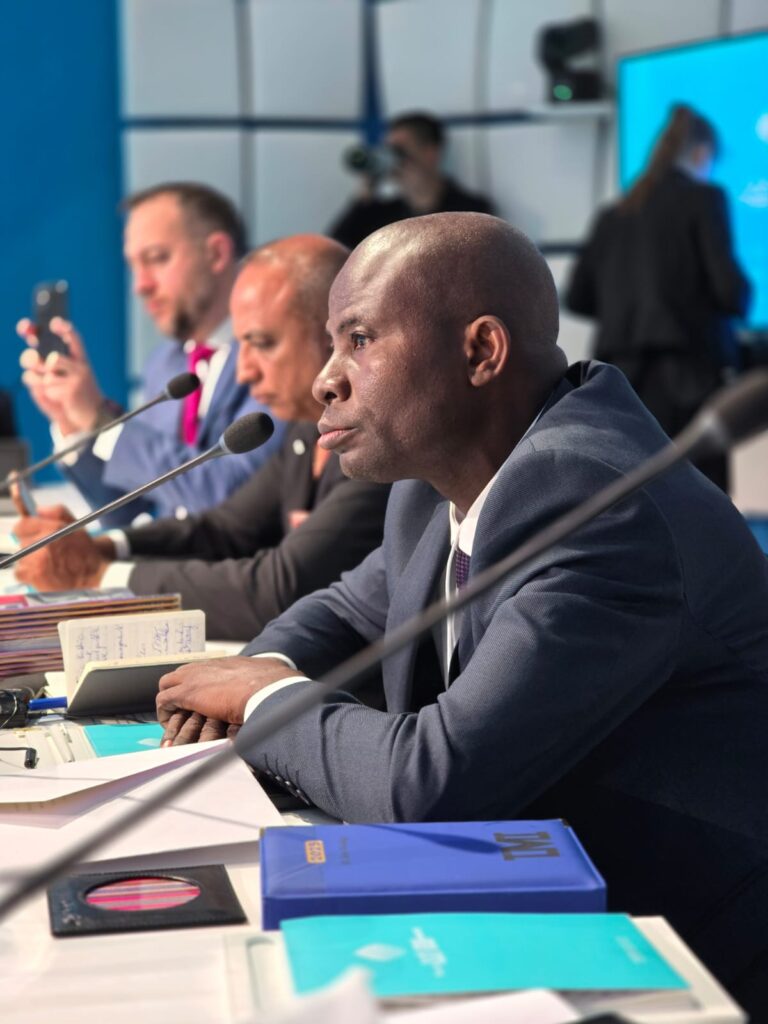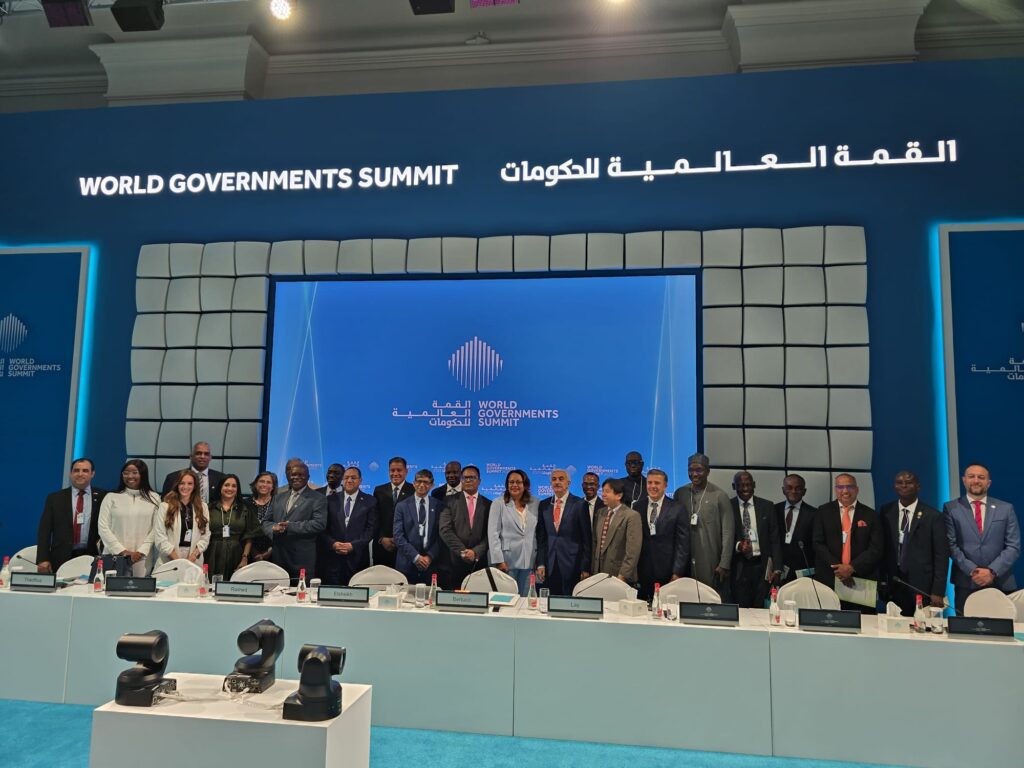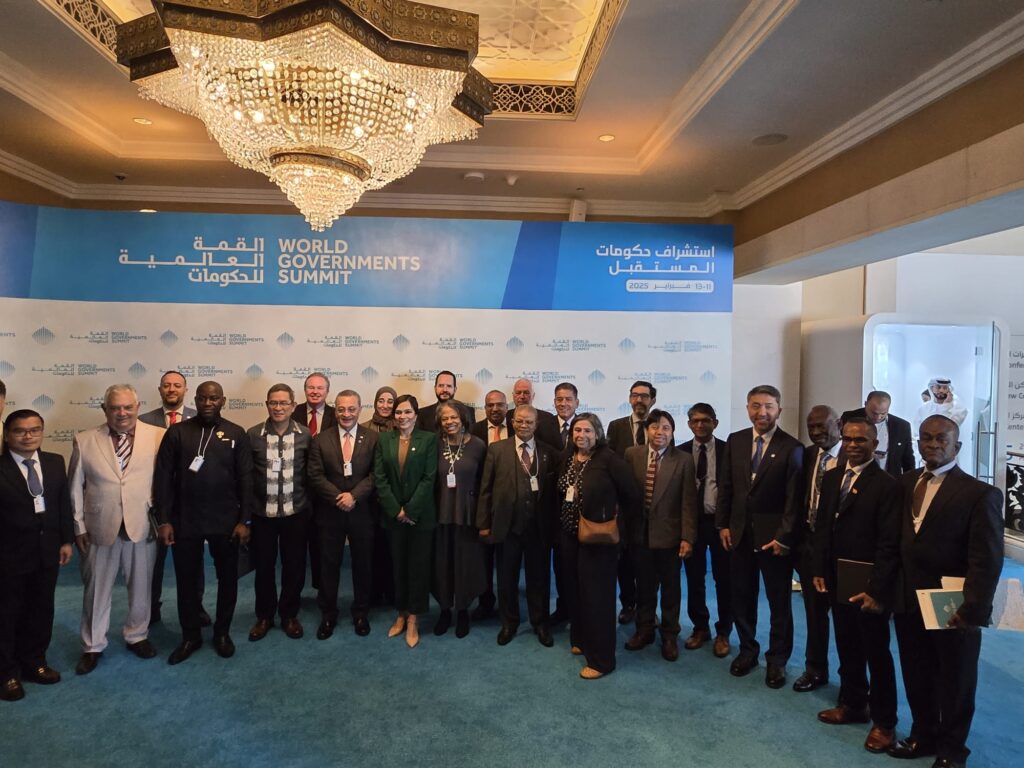World Government Summit (WGS) 2025 in Dubai: The Director-General of CAFRAD Demonstrates Leadership in Service of the African Cause

Dubai, February 11-13, 2025 – CAFRAD Responds Brilliantly to the Invitation of the 2025 World Government Summit (WGS)
The CAFRAD Director-General, accompanied by a strong ministerial delegation representing African countries, responded with excellence to the invitation of the 2025 World Government Summit, held in Dubai, United Arab Emirates, from February 11 to 13, 2025. The delegation was mobilized for this major global event.
A Gathering of Global Leaders to Define the Future of Humanity
In a turbulent, uncertain, and dangerous world marked by strategic rivalries, the frantic race for technology, generative artificial intelligence, humanoid robots, geopolitical risks, increasing inequalities between people and within states, asymmetric conflicts, trade wars, economic and informational warfare, the commercialization of life, the disregard for the law, and ethical dilemmas, the World Government Summit shines as a beacon of hope for an international system striving to restore human values, serving as a universal framework for building a more humane world.
The World Government Summit is an unmissable annual event that brings together prominent leaders, political decision-makers, and internationally renowned experts to tackle the most pressing global challenges. Since its inception, the Summit has become a key global platform, fostering international collaboration by bringing together governments and the private sector to transform the global landscape.
The WGS addressed six key themes through 15 global forums, as well as over 110 dialogues and interactive sessions. More than 200 distinguished speakers, including presidents, ministers, and visionaries, shared their ideas during 23 ministerial meetings and executive sessions, with the participation of more than 300 ministers.
Under the theme “Shaping the Governments of Tomorrow” the summit brought together a brilliant selection of speakers to explore emerging global trends and changes, as well as ways to foster collaboration on a regional and global scale. The plenary sessions featured active participation from heads of state and government, government delegations, representatives from international and regional organizations, as well as opinion leaders, experts, and renowned academics.
Unprecedented African Participation
Since the first World Government Summit held in Dubai in 2013, Africa has participated each year. However, the continent’s involvement in the 12th edition, held from February 11 to 14, 2025, was unprecedented. The number of ministerial delegates notably increased under the leadership of CAFRAD’s Director-General, who led a delegation of around ten African ministers, in contrast to previous editions.
Two Roundtables for the African Delegation: Building a Resilient Africa
On February 12, 2025, CAFRAD participated in two regional roundtables organized under the theme “Effective Governance and Resilience in the Face of Crises” These discussions were marked by active and valuable participation from the countries, which shared their national experiences on key topics such as best practices, technology and innovation, creating the conditions for sustainable development, and strengthening institutional capacities to shape the governments of tomorrow—governments resilient in the face of crises.
Countries such as Cuba, Chile, Spain, Namibia, the Philippines, the United States, Costa Rica, Kazakhstan, Madagascar, Senegal, Egypt, Mauritius, and many others shared their experiences during these roundtables, to name just a few.
The CAFRAD Director-General Presents His Vision for a Resilient Africa
The roundtables provided a precious opportunity for CAFRAD’s Director-General, Dr. Coffi Dieudonné ASSOUVI, to present the African regional perspective on the topic. The increasing frequency of natural disasters, coupled with their growing likelihood, the recurrence of crises of all kinds (economic, financial, political, social, environmental, climate-related, food security, democratic, and security), as well as geopolitical upheavals, asymmetric conflicts, and accumulated interdependence due to globalization, have all placed resilience at the forefront. The Anthropocene describes humankind as a predator of the environment, its nurturing mother. It is no longer a matter of evaluating or anticipating risk, as its likelihood has accumulated, but rather of limiting damage and ensuring recovery after the disaster. Today, no state can afford to question the likelihood of being exposed to risks—these risks are so numerous and frequent that the chance of avoiding them in a globalized world is almost nil. Global crises like the COVID-19 pandemic have demonstrated their lethality and the speed at which they spread, even though Africa has been somewhat resilient in this case.
The most common disasters in Africa are floods and droughts, largely due to climate change. The El Niño phenomenon of 2023/2024 had particularly severe impacts, notably in Southern and Eastern Africa. According to OCHA, six countries declared a state of emergency due to severe droughts linked to El Niño, including Botswana, Lesotho, Namibia, Malawi, Zambia, and Zimbabwe in August 2024.

A Resilient Africa: Building Capacity to Overcome Crises and Uncertainties
A resilient Africa is one that has the ability to withstand negative shocks and stresses, to adapt, and to learn to live with changes and uncertainties. It is the “capacity to withstand, recover from, or adapt to the consequences of a shock or change.” Resilience is a long-term approach that focuses not only on the ability to bounce back but also on integrating adaptation and transformation when change occurs.
According to Dr. Coffi Dieudonné ASSOUVI, Director-General of CAFRAD, in order to build a resilient Africa, it is necessary to go beyond the existing local, national, regional, and international instruments, which in many cases are insufficient to adequately prepare for a true response to the scourges already affecting a fragile Africa. Promoting consensual and effective governance, open government, and participatory democracy is essential for the development of state resilience. It is urgent to build a resilient Africa in the face of the multifaceted and diverse crises that affect both the world and Africa. To achieve this, he urges African governments and the African Union (AU) to give major priority to risk governance in Africa by adopting robust disaster risk reduction strategies, as outlined in the Sendai Framework 2015-2030. In October 2024, around 32 sub-Saharan African countries have national strategies, though some need to be updated.
Furthermore, the Director-General of CAFRAD advocates for:
- i) a comprehensive, holistic, systematic, and integrated approach to risk and crisis management;
ii) appropriate investment in disaster risk reduction, without which it is impossible to achieve the Sustainable Development Goals (SDGs);
iii) crisis prevention through a functional and effective early warning system;
iv) the construction of smart cities as required by SDG 11 (sustainable cities and communities);
v) increasing the purchasing power of populations;
vi) raising awareness, informing, and training stakeholders;
vii) utilizing information and communication technologies for risk and crisis management;
viii) involving all stakeholders, including civil society, the private sector, women, and youth, in the risk management process…
In any case, he calls on African states, regional economic communities, and the African Union to develop an African approach to the management of geopolitical, cyber, natural, human, technological, biological, and bacteriological risks—understanding that the postmodern era is characterized by diffuse risks, volatility, uncertainty, complexity, ambiguity, and paradoxes—and to take preventive action on the hazards and vulnerabilities affecting populations.
He took this opportunity to present his vision for a renewed CAFRAD and the ambitious roadmap he has developed for the years ahead. Based on its activity programs, CAFRAD works at four (4) levels in building a resilient Africa:
i) training and developing the skills of decision-makers and other stakeholders;
ii) the formulation and evaluation of policies, plans, and programs for disaster preparedness and emergency interventions, along with tools like contingency plans, a multi-hazard and multi-sectoral early warning system focused on populations (as of October 2024, only 45% of African countries have early warning systems, and even then, the definition of “early warning” varies, with some systems including technology and data necessary for early warning but lacking effective communication mechanisms and community action), risk mapping, mitigation measures, “risk profiles” to predict future disasters, the “Making Cities Resilient Scorecard,” which helps local communities assess their disaster preparedness and identify areas for improvement, such as governance, budgets, and infrastructure adequacy, etc.;
iii) conducting studies on vulnerability, fragility, crisis management, and global risk governance;
iv) benchmarking, best practices, innovative practices, as well as the bad practices and mistakes of other countries; and v) post-crisis support.
The two roundtables were greatly enriched by valuable discussions and pertinent contributions, which will inspire positive changes on a global scale and contribute to shaping a better future for future generations. Thus, the focus was on resilience and disaster risk reduction, which encompass preparation, prevention, and long-term strengthening of resilience in the face of future risks.
Following these discussions, the Director-General of CAFRAD held bilateral exchange sessions with various representatives of member states, as well as with some partners such as the Latin American Centre for Administration and Development (CLAD).
He also held a debriefing session with the Representative of the World Government Summit, Dr. Guido BERTUCCI, for post-summit follow-up that could lead to a sustainable strategic partnership between CAFRAD and the United Arab Emirates.
In another vein, the Summit made public approximately 25 strategic reports on key trends and practices in crucial sectors. These reports will be the outcome of forums, ministerial meetings, and knowledge-sharing sessions.
The participation of the African ministerial delegation at the World Government Summit was a success. The Director-General of CAFRAD, highly satisfied, expresses his deep gratitude to the highest Emirati authorities.
The Sendai Framework has defined four priorities for action:
Priority 1: Understanding disaster risks;
Priority 2: Strengthening disaster risk governance to manage risks better;
Priority 3: Investing in disaster risk reduction to strengthen resilience;
Priority 4: Improving preparedness for effective response and to “Build Back Better.”





